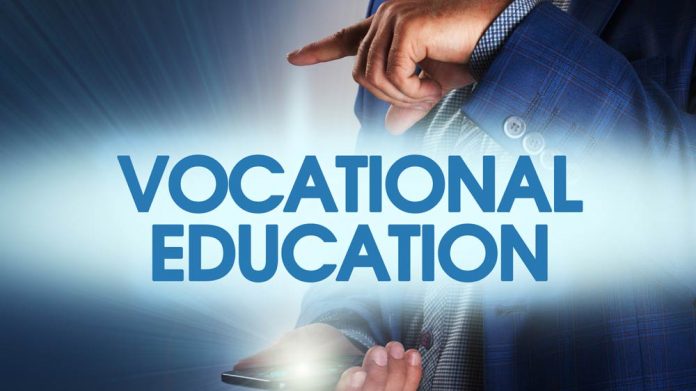
TVET Authority Develops Trainers Qualification framework:
Technical and vocational education and training (TVET) is the most practical avenue for acquiring readily employable skills for the world of work. Africa needs skilled workers. The TVET sector has often been marginalized in the allocation of resources in national education and training .
TVETA has developed new a Trainers Qualification Framework that will guide training in the TVET sector.
For more information read TVET Authority Director General’s Dr Kipkirui Langat piece below.
By Dr. Kipkirui Langat
As we enter the critical phase of our development agenda, the government, through the various agencies in the TVET sector has embarked on a plan to expand and nurture a critical mass of competent skilled workers, particularly experts in priority areas relevant to Vision 2030, the Big Four agenda and other development blue-prints.
The TVET Act of 2013 has vested on the Technical and Vocational Education and Training Authority (TVETA) the responsibility to accredit all the persons involved in training in the TVET sector to ensure quality of training. The law has also tasked the Authority the advice on the development of Schemes of Service for trainers and the development of standards and guidelines for training and assessment in the TVET sector.
It is within this legal backing that the TVET Authority has set out to increase a critical and relevant pool of expert trainers in number of skill-sets to ensure there is quality.
One of the things the Authority has developed to ensure the delivery of job ready graduates is the development of Trainer Qualification Framework, a proposed set of guidelines designed to be used during training, recruitment and maintenance of quality trainers in both public and private TVET institutions.
A qualification framework provides quality assurance by ensuring that all qualifications on offer at educational institutions are authorized by accrediting agencies. This framework sets accreditation indicators for each qualification level and establishes equivalencies between qualifications at all levels.
All over the world, qualifications frameworks based on learning outcomes is one of the tools that has been used to reform and expand educational and training provision in ways that will raise skills levels, improve labour market productivity and contribute to sustainable development.
But first, we need to understand the requirements of the persons referred as “trainer” in the context of TVET. The TVET Act 2013 and its subsidiary regulations of 2015 requires that any person who intends to become, a trainer in a TVET institution shall apply to the TVET Authority for a trainers’ license. The trainer should have the training qualifications required for implementation of Competency-Based Education and Training (CBET) curricula in various training levels.
The trainer should have the following minimum competencies. Competence to plan a training session and deliver competency-based training (CBET) be able to conduct competency assessment; and maintain training facilities and ensure internal quality assurance.
After successful licensing, the trainers shall be required to renew their training licence periodically with evidence of continuous professional development as required by the Authority. These regulations form the basis for the proposed Qualification Framework for TVET trainers.
Before coming up with the qualifications’ framework, the Authority had to benchmark on what other successful jurisdictions have done so that we can design what can best work for our needs, as much as much as we train our students to exploit opportunities at the regional and continental level. We picked some lessons from the Dutch model of training, which assumes that every trainer needs the same competencies and that the qualification of trainer is based on bachelor’s degree level (level 5 in a 7-level framework). We also studied the Australian model, which require one to have level 4 of trainer qualification in addition to academic or skill qualifications.
Further, we looked at the Philippine model, which has 4 levels that takes care of progression in grade and profession. We decided to pick on this framework because we share many similarities with Philippines, including the fact that it is a fast-developing nation just like Kenya.
At the base of the framework is Level 1, which targets “Technical Instructors” who are expected to be able to set training material, equipment for practical workshop or laboratory and maintains training equipment. The expected qualifications include someone who has undertaken a Craft/KNQF level 5 or equivalent in the technical/vocational domain (craft) and a certificate of an approved Trainer of Trainers (ToTs) for Technical Instructors. Their curriculum includes a course supporting CBET trainers.
In Level II we have “Trainer”. The entry requirement at this level include a bachelor’s degree, KNQF level 7 in the technical/vocational domain plus a certificate of an approved ![]() ToT for Trainers. Their core competencies include making plans for instruction, conduct training sessions ensuring integration of theory and practice, assess the student’s competencies, integrates ICT and other appropriate media in training among others.
ToT for Trainers. Their core competencies include making plans for instruction, conduct training sessions ensuring integration of theory and practice, assess the student’s competencies, integrates ICT and other appropriate media in training among others.
At Level III we have “Senior Trainer/Developer” whose main mandate is to design and develop curriculum, courses and instructional materials. The entry requirements include Masters/KNQF level 9 or equivalent in the technical/ vocational domain and or experience as trainer (minimum 4 years) plus approved ToTs for developers.
Lastly at Level IV we will have “Principal Trainer/Manager” who will be responsible for the management on day to day running of training a department in an institution. The entry requirements include Masters/KNQF level 9 or equivalent in the technical/ vocational domain and/or experience as trainer (minimum 4 years) + approved ToTs for training managers.
In addition to technical and professional qualifications, the Authority has also development requirements for those who are going to oversee management of TVET institutions. The emphasis is on leadership management and governance to ensure that institutions remain focused in achieving their primary object, which is development of competent workforce.
Meanwhile the Authority is in the process of taking stock of who among the current serving trainers meet the requirements of the framework with a view of developing capacity building plan to ensure that all trainers will eventually conform to the framework. The Authority also in consultation with stakeholders in TVET so as to develop an implementation plan of this framework.
Employment Scheme & Guidelines and Recruitment Score Sheet for Tutors in Technical Institution/Teacher Training College
Anybody willing to apply should at least have scored a mean grade of C+ at KCSE or its equivalent and at least C+ (or Credit Pass) in the two teaching subjects or one (1) principle and two (2) subsidiaries at “A” level. In addition they must have;
- Bachelor of Education Technology ( B.ED TECH) or
- Bachelor of Science B.SC in any relevant technical subject/course.
- Higher Diploma in a technical course.
- A diploma in Technical course.
Further, they must have a diploma in Technical Teacher Education from Kenya Technical Teacher College (KTTC) or a post Graduate Diploma in Education from a recognized Institution.
Person with disability (PWD)- Hearing impaired and blind are admitted to the training with a mean grade of C and C in the two teaching subjects.
For applicants trained in Special Needs Education, KSL and Braille are considered as teaching subjects
Here is the score sheet for both graduate and diploma teachers; e.g Biology/KSL, Geography/Braille.
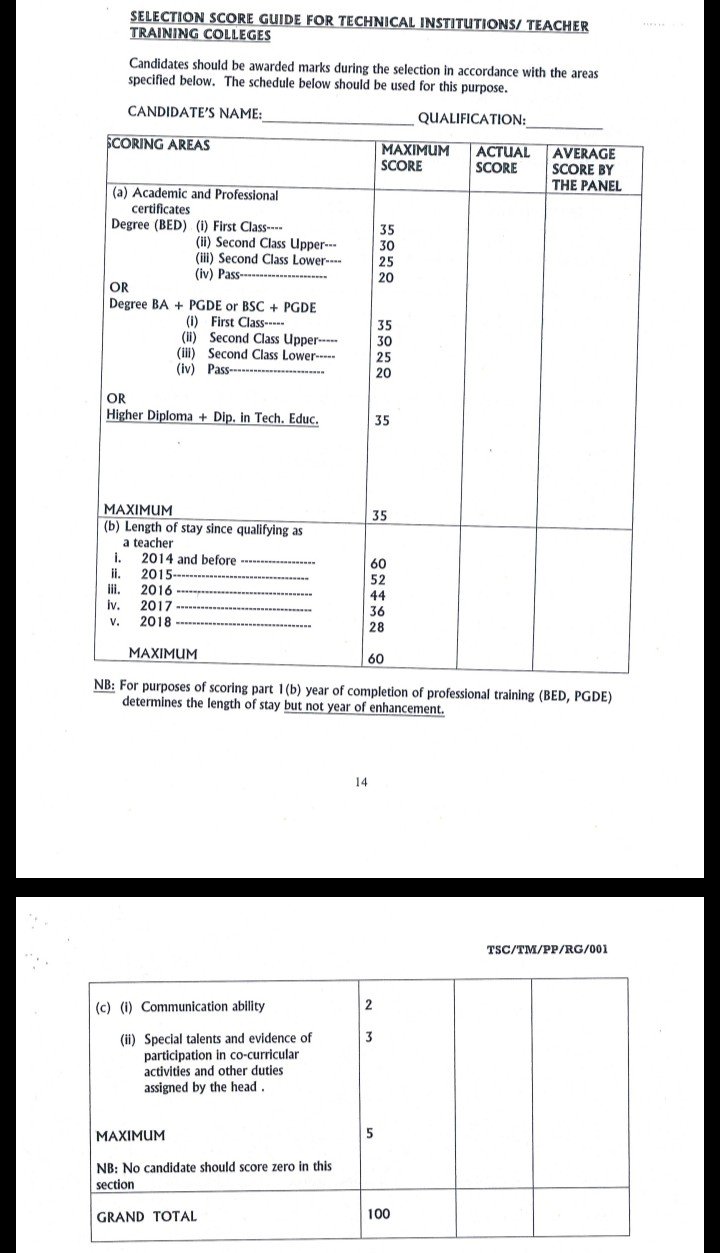
Grading system for tutors in Technical Institution/Teacher Training College
Here is job groups for teachers in Technical Institution/Teacher Training College
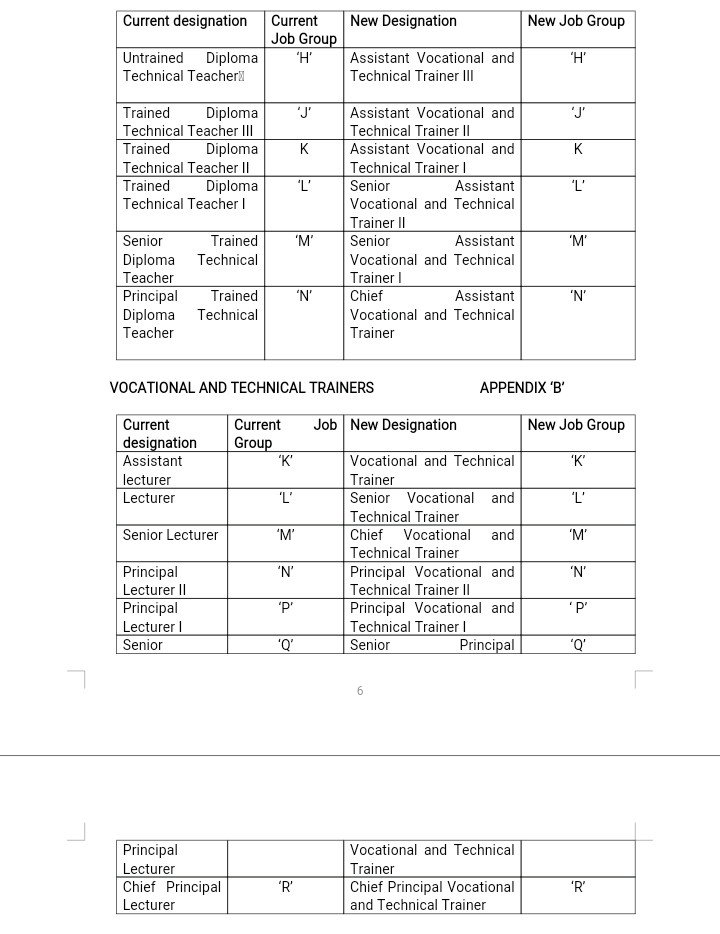
Qualifications for Technical Institution and Vacation Training Tutors
The following are the recognized qualifications one to teach in Technical Institution and Vacation Training:-
- Diploma in technical education from a recognized institution.
- Diploma in any of the following fields: Education Medical laboratory, Pharmacy, Nutrition Dietetics, General Agriculture, Agriculture Engineering, Agronomy, Building and Civil Engineering, Entrepreneurship, Petroleum, Geophysical/Sciences, ,Performing Arts, Counseling Psychology, Survey, Marine Engineering, Engineering, Architecture, Communication, Mechatronics, Education, Information and Communication Technology, Textiles/Clothing Technology, Chemical Engineering, Catering or Hospitality Management, Business Studies/Administration, Applied Science or equivalent qualification from a recognized institution.
- Bachelors degree in technical education from a recognized institution
- Bachelors degree in any of the following: Education, Business Administration, Applied Science, Technology, Medical laboratory, Pharmacy, Nutrition Dietetics, General Agriculture, Agriculture Engineering, Agronomy, Building and Civil Engineering, Entrepreneurship, Petroleum, Geophysical/Sciences, Performing Arts, Counseling Psychology, Survey, Marine Engineering, Engineering, Architecture, Communication, Mechatronics, Education, Information and Communication Technology, Textiles/Clothing Technology, Chemical Engineering, Catering or Hospitality Management, Business Studies/Administration, Applied Science, or equivalent qualification from a recognized institution.
- Masters degree in any of the following fields:- Engineering, Architecture, Information and Communication Technology, Textiles/Clothing Technology, Chemical Engineering, Catering or Hospitality Management, Business Administration, Entrepreneurship, Business Administration, Technology, Education Administration, Planning and Policy; Curriculum Development; Applied Science Applied Sciences, Medical laboratory, Pharmacy, Nutrition Dietetics, General Agriculture, Agriculture Engineering, Agronomy, Building and Civil Engineering, Entrepreneurship, Petroleum, Geophysical/Sciences, Performing Arts, Counseling Psychology, Survey, Marine Engineering, or equivalent qualifications from a recognized institution.
Strategic Leadership Development Program Course lasting not less than six (6) weeks from a recognized Institution. - Senior Management course lasting not less than four (4) weeks from a recognized Institution.
Certificate in Training of Trainers lasting not less than six (6) weeks.
Certificate in Supervisory Management lasting not less than two (2) weeks.
Certificate in Computer proficiency


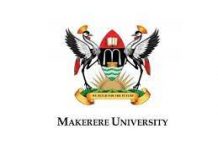
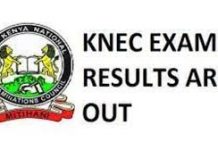

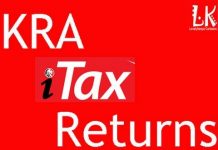







Have a diploma in clothing technology and textile under KNEC(scored Credit)
Quality articles is the key to invite the viewers to pay a quick visit the website, that’s what this web site is providing.| а
Thank you
I am SIMON MATI,a teacher by profession under TSC.I have a degree in Education,special Need (Braille) and Biology and Masters in MBA finance Accounting and CPA Student section 4. Very much much interested to teach in technical institutes.I had applied for departmental transfer by last year mid February like now but no response but I can you are coming up with new strategies,kindly can apply again for reconsideration. Thanks
When is the intake for new students
Kindly respond
I have a c- in my o level, credit in diploma on each modules, diploma in technical education from kttc, do i qualify to be hired by psc